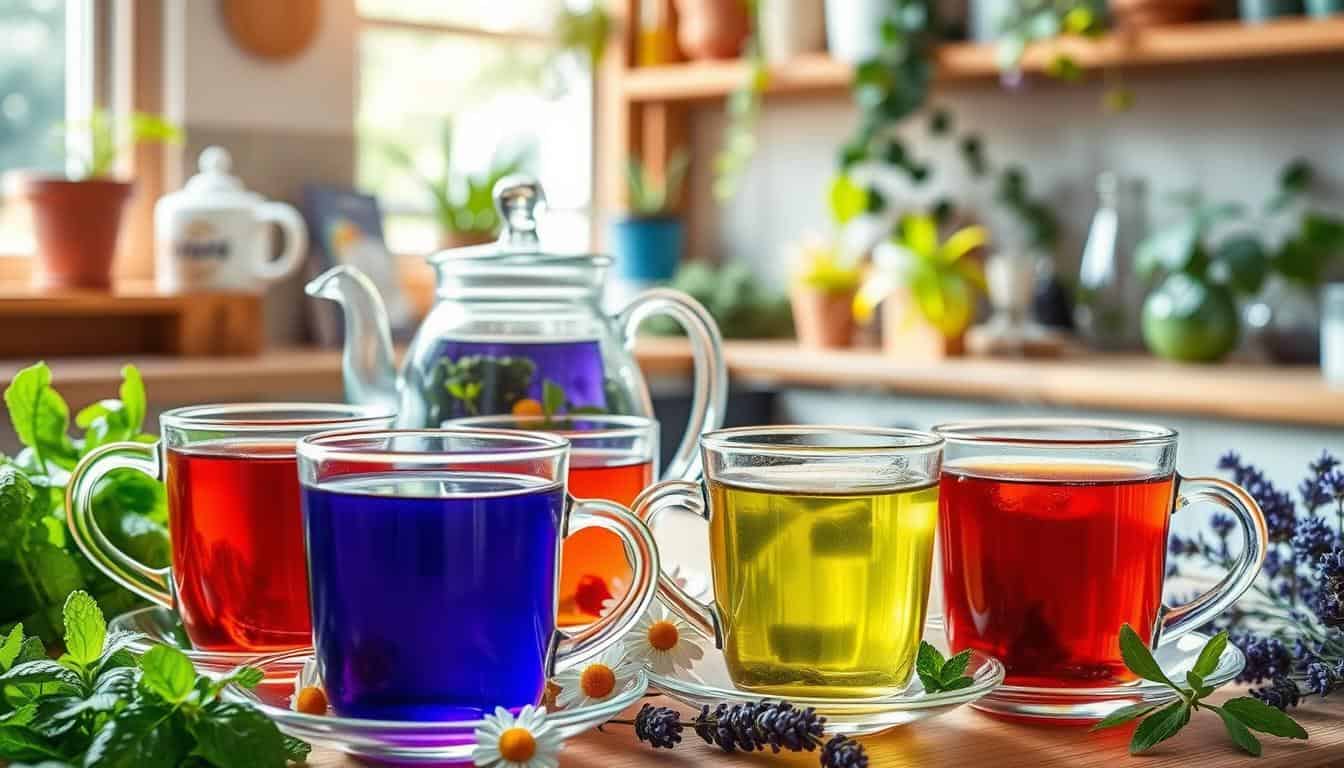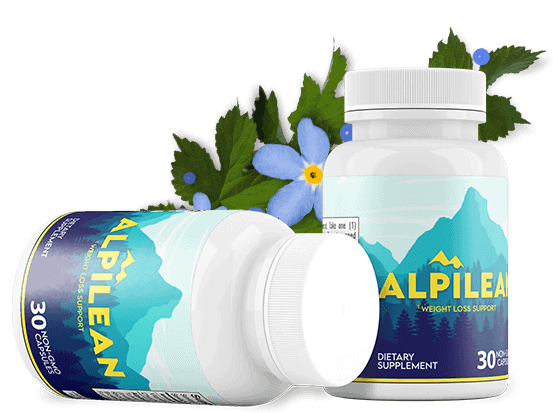Complete Guide to Herbal Tea Benefits for Health
This post may contain affiliate links which means I may receive a commission for purchases made through links at no extra cost to you. I only recommend products I truly believe in. Thank you for your support!
I love tea and have learned a lot about herbal teas. They are made from many things like fruits, flowers, and herbs. These teas don’t have caffeine and have been used for health for a long time1.
Herbal teas can help you sleep better and keep your immune system strong. In this guide, we’ll explore herbal teas. We’ll look at what they are, what’s in them, and their health benefits. Let’s discover how these teas can make us healthier21.
Key Takeaways
- Herbal teas offer a wide range of health benefits, from supporting heart health to improving digestion and sleep quality.
- Unlike traditional teas, herbal teas are made from a variety of dried fruits, flowers, spices, and herbs, each with its own unique properties.
- Herbal teas are typically caffeine-free, making them a popular choice for individuals looking to reduce their caffeine intake.
- Certain herbal teas, such as chamomile, peppermint, and ginger, have been found to have specific health-promoting effects.
- Incorporating herbal teas into your daily routine can be a simple and enjoyable way to support your overall well-being.
What Are Herbal Teas?
Herbal teas, also called tisanes, are drinks made from plants like flowers, leaves, and roots. They are made by soaking these parts in hot water3. Unlike regular teas, herbal teas don’t have caffeine. This makes them a great choice for those who want to avoid caffeine’s effects4.
Definition and Types of Herbal Teas
Herbal teas are not made from the Camellia sinensis plant like regular tea4. They offer many flavors and health benefits without caffeine. You can find many types, like chamomile, peppermint, and ginger5.
Common Ingredients Used
- Chamomile: It’s good for inflammation, digestion, and can help with anxiety and immunity5.
- Peppermint: It can improve memory, boost energy, and ease headaches5.
- Ginger: It’s great for immunity, reducing inflammation, and soothing sore throats5.
- Hibiscus: It’s full of antioxidants, iron, and vitamin C, and may lower blood pressure5.
- Echinacea: It’s thought to support the immune system and fight inflammation4.
- Rooibos: It’s packed with antioxidants, good for the heart, and may fight cancer5.
- Lavender: It can help with stress, sleep, mood, and immunity5.
- Lemongrass: It soothes anxiety, boosts immunity, and is full of antioxidants5.
- Rose Hips: It’s rich in vitamin C, great for the immune system4.
- Passionflower: It can calm you down and help with sleep and anxiety4.
- Cinnamon: It may help control blood sugar after meals4.
- Turmeric: It has curcumin, which is good for antioxidants and fighting inflammation4.
Herbal teas are usually safe, but some might cause allergies or interact with medicines4. Always be careful and talk to a doctor, if you have health issues or take medicines4.
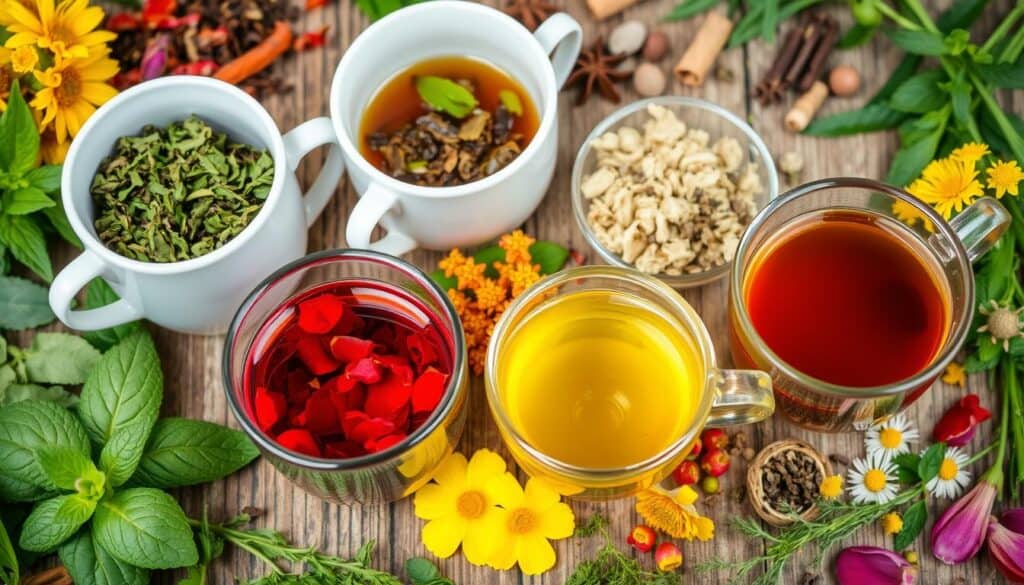
Health Benefits of Herbal Tea
As a tea lover, I’ve found herbal teas amazing. They taste great and are good for you. Studies show they can help prevent serious diseases like cancer and heart disease6.
Herbal teas are full of antioxidants. Green tea, for example, has more antioxidants than black tea6. These antioxidants fight off bad stuff in our bodies and keep us healthy.
Boosting Immune Health
Teas like echinacea can make our immune systems stronger6. Our bodies can absorb some of these good things, helping us fight off sickness6. Drinking these teas every day makes me feel better and less sick.
Supporting Digestive Wellness
Herbal teas are also good for our stomachs. Peppermint and ginger teas can ease stomach pain and help us digest food better7. They make our stomachs feel better without hurting them7.
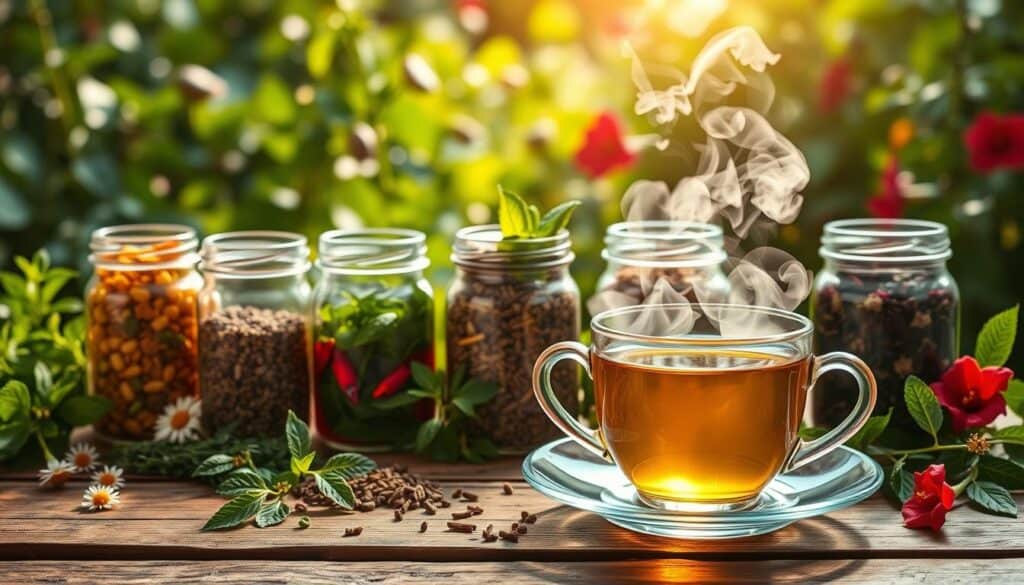
Herbal teas do more than just boost our immune system and help our stomachs. They can help us lose weight, control blood pressure, and even make us smarter7. Drinking different herbal teas every day makes me feel better and live better.
“Herbal teas have become an integral part of my self-care routine, providing me with a soothing and rejuvenating experience while also supporting my body’s natural healing processes.”
Exploring herbal teas is exciting. They offer many benefits, from boosting our immune system to helping our stomachs. Adding these teas to our daily lives is a simple way to get healthier and feel better.
Popular Herbal Teas and Their Benefits
I love tea and have tried many herbal teas. Each one has its own health benefits. From calming chamomile to energizing ginger, herbal teas are full of natural goodness. Let’s look at some popular ones and how they can help us feel better.
Chamomile Tea
Chamomile tea is known for its calming effects and improving sleep8. It smells like flowers and can help with colds, heart health, digestion, and boost the immune system8. Drinking chamomile tea every day has really helped me relax and feel calm.
Peppermint Tea
Peppermint tea is refreshing and full of benefits8. It can improve memory and energy, thanks to its antioxidants9. It also helps with stress, cramps, and cold symptoms, making it a great choice8.
Ginger Tea
Ginger tea is great for health8. It fights inflammation and boosts the immune system, helping fight colds and flu8. It also soothes sore throats, aids digestion, and might even help prevent cancer8. Ginger tea is a favorite in my home for its natural benefits.
Rooibos Tea
Rooibos tea, from South Africa, is packed with health benefits9. It’s full of antioxidants that support heart and bone health, and reduce inflammation910. It’s caffeine-free and low in tannins, making it a gentle choice for a calming drink.
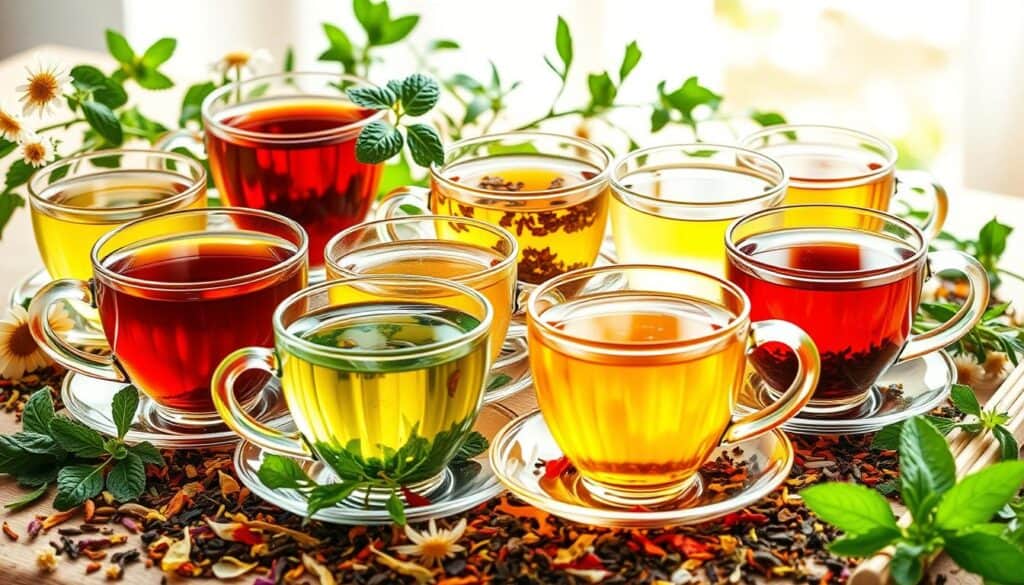
These teas are just a few examples of the many herbal teas out there. Whether you want to relax, improve digestion, or boost your health, there’s a tea for you. I suggest trying different types of herbal teas to find the herbal tea benefits guide that’s right for you.
How to Brew the Perfect Cup of Herbal Tea
Making the perfect herbal tea is like a little art. You need the right water temperature and steeping time. Most teas steep anywhere from 3 – 15 minutes, with longer steeping resulting in a more bitter taste.11 Loose leaf teas are often better because they’re fresher. But, different herbs steep for different times. Delicate ones like chamomile and hibiscus need 5-7 minutes. Heartier herbs like mint and lemongrass steep for up to 10 minutes.12
Herbal teas with harder ingredients like roots may need at least 30 minutes to steep. Sometimes, they even simmer on the stove.11 Using high-quality loose-leaf herbs is key for the best flavor, aroma, and health benefits. Freshness is very important.12 To make a perfect cup of herbal tea, follow these steps:
- Use fresh, pure water. Water is the base for all herbal teas. It affects taste and health benefits. Adding a bit of lemon juice can help balance flavors.13
- Heat the water to just below boiling.
- Measure the right amount of herbal tea. One teaspoon of loose-leaf herbs per eight ounces of water is perfect.12
- Steep the tea for the right time. Delicate herbs need 5-7 minutes, and heartier ones up to 10 minutes.
- Strain the tea and pour it into your favorite mug.
- Add a bit of honey to sweeten it. Using honey is a good idea. A little goes a long way, and many prefer tea without added sweeteners.11
- Enjoy your perfectly brewed herbal tea!
By following these steps, you can enjoy your favorite herbal teas fully. Happy brewing!
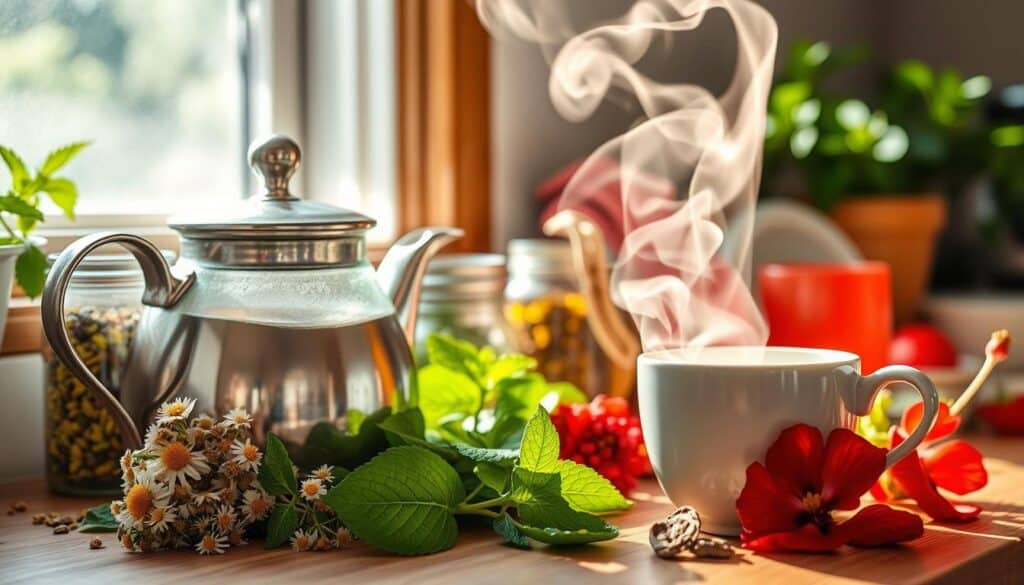
Herbal Tea for Stress Relief
Herbal teas are great for finding peace in our busy lives. Teas like chamomile, lemon balm, and passionflower calm us down. They help us feel less anxious and more peaceful14.
Drinking herbal tea can be a special moment for you. It helps you relax and feel better overall15.
Calming Properties of Herbal Teas
Some herbs in tea can really help with stress. Green tea has L-theanine, which makes our brains work better14. Lemon balm makes us feel less stressed and anxious14.
Teas with passionflower, chamomile, and lavender also help us relax15.
Personal Experiences with Tea Rituals
Having a tea ritual can really help you relax. Drinking a warm herbal tea, like chamomile or peppermint, makes me feel calm14. The smell, the warmth, and enjoying the moment all help me relax15.
Herbal tea is a big part of my self-care. It helps me take a break from the world and be present16. It’s helped me deal with anxiety and stay calm14.
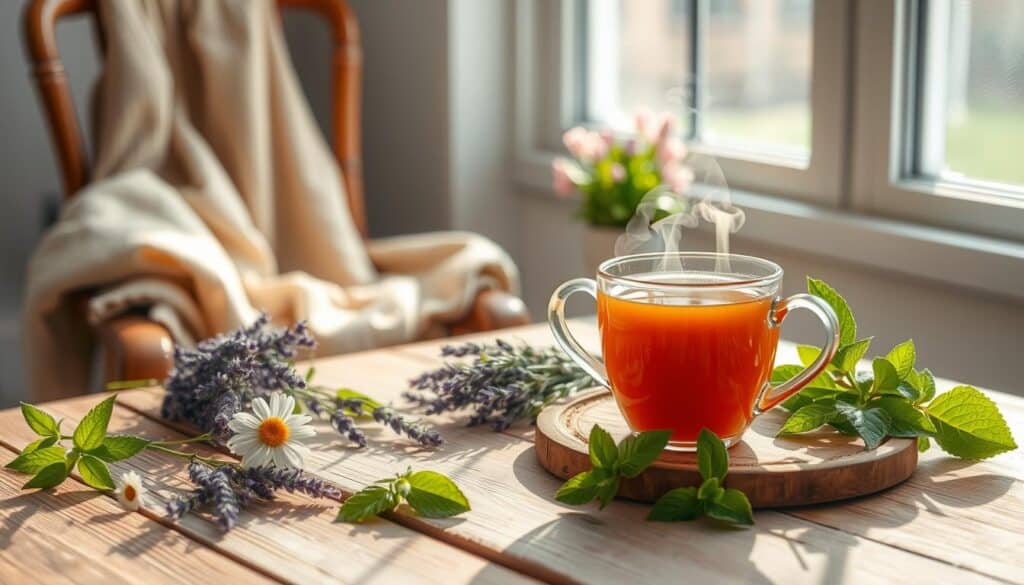
“The ritual of brewing a cup of tea and taking the time to savor it has become a crucial part of my stress-management routine. It’s a moment of mindfulness that helps me find balance and clarity amidst the chaos of daily life.”
Enhancing Sleep with Herbal Teas
I love tea and have learned some teas help you sleep better17. Teas like heather, chamomile, and lemon balm are good for sleep18. Chamomile tea has a special part called apigenin that helps calm you down.
Herbal Blends for Better Sleep
18 Making your own tea mix can help you sleep better18. Valerian root is like a natural calm-down. It helps you fall asleep faster and sleep better19.
19 Lavender tea can make you feel less stressed and anxious19. It’s also shown to help women with insomnia sleep better19. Passionflower tea has GABA, which helps you relax and sleep.
My Favorite Nighttime Teas
17 Escholtzia tea works fast for sleep17. Hawthorn, passion flower, and valerian tea help with anxiety17. Teas like poppy and jasmine also help you sleep well.
18 It’s best to drink herbal tea 30-60 minutes before bed18. Drinking one to two cups before bed is good, but it works differently for everyone18. Most teas start working in 30-60 minutes.
19 Coffee has a lot of caffeine, making it hard to sleep19. Even decaf coffee has a bit of caffeine, which can affect sleep19. Drinking caffeine in the evening can make it hard to fall asleep and sleep less deeply.
Drinking herbal tea before bed helps me relax and sleep better17. It’s best to drink herbal tea 30 minutes before bed for the best results.
Potential Side Effects of Herbal Teas
Herbal teas are usually safe and good for you. But, it’s key to know about possible side effects and how they might mix with other things. As herbal teas are very popular in America today20, talking to a doctor before drinking them is smart. This is true if you have health issues or take medicine.
Allergic Reactions to Consider
Some people might be allergic to certain herbs in teas. Common ones are chamomile, echinacea, and ginger. Symptoms of an allergic reaction may include skin rashes, hives, itching, digestive issues, or difficulty breathing. Watch out for any signs of allergy and stop drinking the tea if you get sick.
Interactions with Medications
Herbal teas might not get along with some medicines. For instance, licorice root can mess with blood pressure meds20. Also, hibiscus tea might not work well with blood pressure meds20. And, echinacea could clash with drugs that weaken the immune system20. Always check with your doctor before drinking herbal teas, if you’re on any meds.
Herbal teas are good for you, but be careful. Knowing the risks and talking to doctors is important. This way, you can enjoy the benefits of herbal teas safely2021.
“Herbal medicines carry risks despite their health benefits, according to the National Institute of Health’s Library of Medicine.”21
Incorporating Herbal Teas into My Daily Routine
Herbal teas are now a big part of my daily routine. I start with peppermint or ginger tea to wake up and focus22. These teas are refreshing and good for me, making mornings better.
Mornings with Herbal Tea
Drinking herbal tea in the morning makes my day better. Matcha green tea is my favorite because it helps me relax and think clearly22. It’s a nice way to start, planning my day or reading something inspiring.
Herbal Tea as an Afternoon Boost
When I feel tired in the afternoon, herbal teas help. Rooibos and chamomile teas keep me hydrated23 and help with soreness and digestion22. They give me a break and help me stay focused.
Herbal teas have changed my life, making me feel better every day. They give me energy in the morning and calm me down in the afternoon23. They help me relax and sleep better22.
“Herbal tea has become a ritual that grounds me, nourishes me, and reminds me to slow down and savor the present moment.”
Conclusion: Embracing the Benefits of Herbal Tea
Reflecting on my journey with herbal teas, I’m amazed. These natural drinks can change our health and happiness. They help with digestion and sleep, showing their amazing benefits24.
My Journey with Herbal Tea
I started loving herbal teas a few years back. I wanted natural ways to handle stress and feel better. I tried different teas and loved how chamomile calmed me and peppermint made me feel awake25.
Using herbal teas daily made my skin, mood, and energy better25.
Encouragement to Explore Herbal Options
If you want to try herbal teas, go for it! There are many to choose from. They can boost your immune system, help your digestion, or just calm you down242625.
By trying these natural remedies, you can help yourself feel better. You might see big changes in your health and happiness.
